Actress Ingrid Andree (1931) was the young, waif-like star of many popular German films of the 1950s. From the 1960s on she mainly appeared in the theatre.
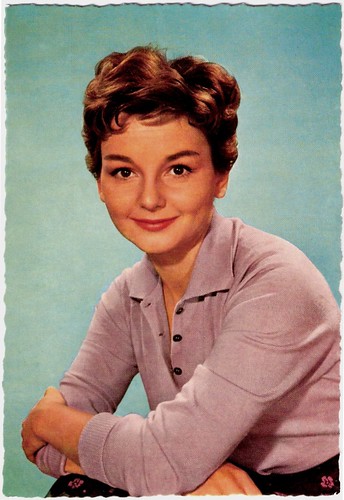
German postcard by WS-Druck, no. F 89. Photo: Klaus Collignon.
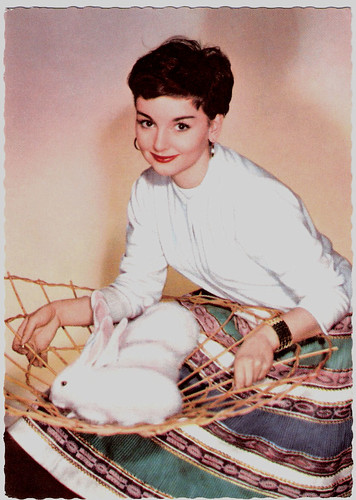
German postcard by Ufa, no. CK-77. Photo: Ringpress / Vogelmann.

German postcard by WS-Druck, Wanne-Eickel, no. F 74. Photo: Ringpress.
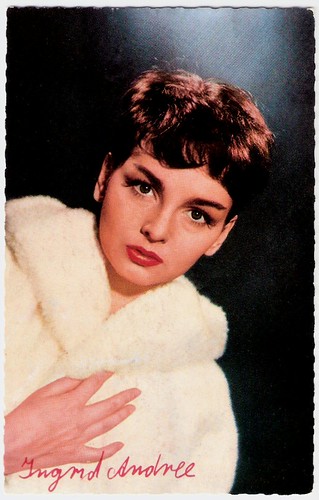
German postcard by Kolibri-Verlag G.m.b.H, Minden (Westf.), no. F 42. Retail price: 25 Pfg. Photo: Ringpress / Stempka.
Ingrid Andree was born as Ingrid Tilly Unverhau in 1931 in Hamburg, Germany. She was the daughter of a coffee importer, and the niece of actor Joachim Gottschalk.
She followed acting classes from Eduard Marks at the School of Music and Performing Arts in Hamburg. In 1951 she made her stage debut in Ivan Turgenev's One Month in the Country at the Thalia Theater.
She made her film debut in a small supporting role in Professor Nachtfalter/Professor Moth (Rolf Meyer, 1950), starring Johannes Heesters. Her first leading part was in Primanerinnen/Sixth-formers (Rolf Thiele, 1951) with Walter Giller and Erich Ponto.
This film was her breakthrough and the following years she played many young girls in popular German comedies like Liebeserwachen/Love's Awakening (Hans Heinrich, 1953) with Winnie Markus, and Roman einer Siebzehnjährigen/Novel of a Seventeen Year Old (Paul Verhoeven, 1955) with Therese Giehse.
Her most important of the 1950s - and most popular film too - was the Thomas Mann adaptation Bekenntnisse des Hochstaplers Felix Krull/Confessions of Felix Krull (Kurt Hoffmann, 1957). She played Zouzou, Liselotte Pulver played Zaza and Horst Buchholz Felix Krull.
For television John Olden adapted in 1958 the stage play Blick zurück im Zorn/Look Back in Anger by John Osborne. She played the female leading part next to Horst Frank. Her last successes in the cinema were the humorist Krimi Peter Voss, der Millionendieb/Peter Voss, Thief of Millions (Wolfgang Becker, 1958) with O.W. Fischer as Peter Voss, and Der Rest ist Schweigen/The Rest Is Silence (Helmut Käutner, 1959), a Hamlet adaptation situated in the period after WW II, with Hardy Krüger and Peter van Eyck.
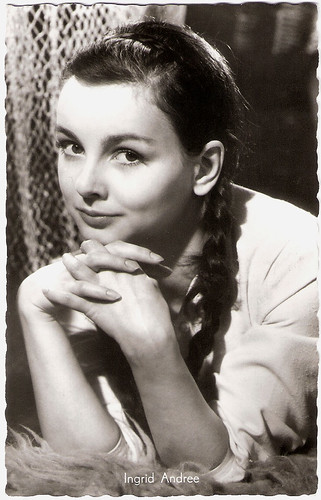
West-German postcard by Kolibri-Verlag, Minden/Westf, no. 1694. Photo: Alfred Greven / Schorcht. Publicity still for Du darfst nicht länger schweigen/You Can No Longer Remain Silent (Robert A. Stemmle, 1955).
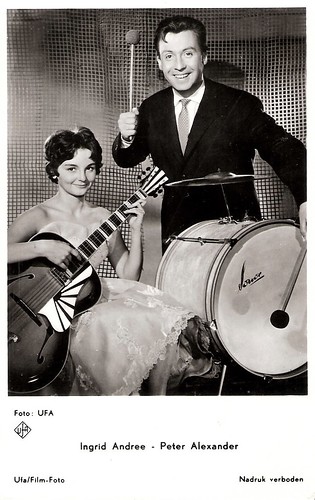
Dutch postcard by Gebr. Spanjersberg N.V., Rotterdam, no. 1218/459. Photo: Ufa (Universum-Film Aktiengesellschaft, Berlin-Tempelhof). This must be a publicity still for the comedy Schlag auf Schlag/Blow On Blow (Géza von Cziffra, 1959) which starred Peter Alexander, Wolfgang Wahl, Ralf Wolter, and Ingrid Andree.
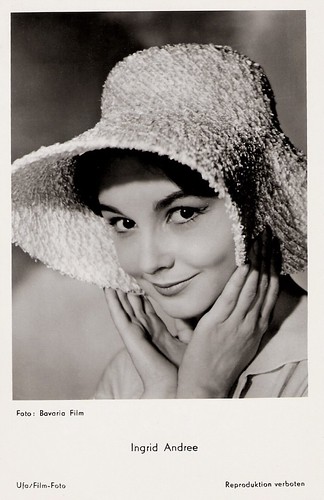
German postcard by Ufa (Universum-Film Aktiengesellschaft), Berlin-Tempelhof, no. FK 4205. Retail price: 25 Pfg. Photo: Bavaria Film. Publicity still for Und nichts als die Wahrheit.
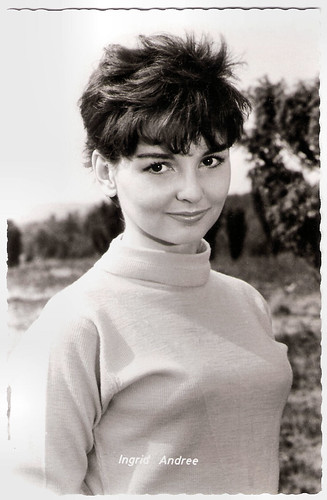
West-German postcard by Kolibri-Verlag, Minden/Westf, no. 916. Photo: Weidenbaum.
From the 1960s on Ingrid Andree focused herself on the theatre. Among her last films were the Krimi Treibjagd auf ein Leben/Hunt for A Life (Ralph Lothar, 1961) with Dietmar Schönherr and Horst Frank, the William Shakespeare adaptation Was Ihr wollt/Twelfth Night (Franz Peter Wirth, 1962), Nachts ging das Telefon/The Phone Rings Every Night (Géza von Cziffra, 1962), and the thriller Polizeirevier Davidswache/Hamburg: City of Vice (Jürgen Roland, 1964).
Her TV performances were mainly theatre adaptations. Since 1969 she was seldom seen anymore on TV. Among her few later TV appearances were guest roles in the Krimi series Der Kommissar (1970) and Derrick (1985).
Andree mainly appeared on stage. From 1967 till 1970 she worked for the Münchner Kammerspielen and from 1971 till 1980 she was a member of the ensemble of the Thalia-Theater in Hamburg under the direction of Boy Gobert. Here she played in 1974 Queen Elisabeth in Maria Stuart under Gobert’s direction. In 1980 she moved on to the Schauspielhaus Köln (Cologne), but in 1985 she returned to the Thalia Theater.
In the early 1990s she switched again to the Schauspielhaus Köln. She also worked as a voice actor for radio and television. She was the German dubbbing voice of a.o. Olivia de Havilland in Die Erbin/The Heiress (William Wyler, 1949), and Ingrid Thulin in Der Ehekäfig/La Cage (Pierre Granier-Deferre, 1975).
She played in Tár úr steini/Tears of Stone (Hilmar Oddsson, 1995), the story of Jon Leifs, Iceland's most celebrated composer, and was filmed in both Iceland and Germany.In 2010, she returned to the screen in Transfer (Damir Lukacevic, 2010). In a futuristic society where the wealthy get to live forever by swapping bodies with refugees, an elderly couple explores this opportunity with harsh consequences.
Ingrid Andree was married from 1959 till 1965 with the actor Hanns Lothar and she is the mother of actress Susanne Lothar. For her work on stage and in the cinema Andree was awarded the Bundesverdienstkreuz.
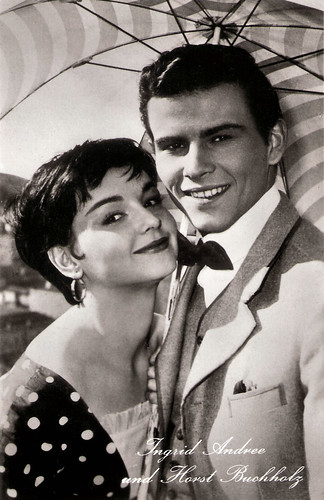
East-German postcard by Progress Film-Vetrieb, no. 1203. Photo: publicity still for Bekenntnisse des Hochstaplers Felix Krull/Confessions of Felix Krull (Kurt Hoffmann, 1957) with Horst Buchholz.
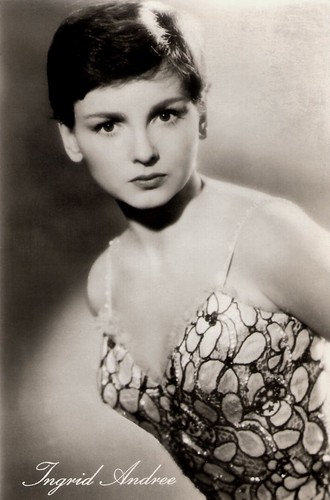
East-German postcard by VEB Progress Filmvertrieb, Berlin, no. 215/374, 1957. Photo: Standard-Film. Publicity still for Drei vom Varieté/Three from Variety (Kurt Neumann, 1954).
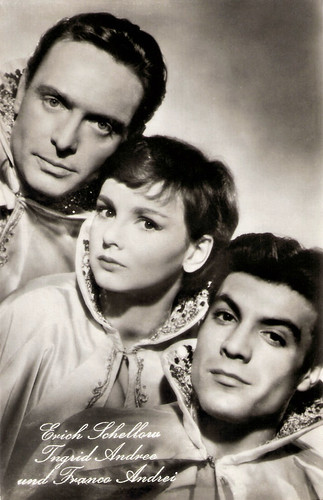
East-German postcard by VEB Progress Film-Vertrieb, Berlin, no. 222, 1957. Photo: Standard-film, Wien. Publicity still for Drei vom Variété/Three from Variety (Kurt Neumann, 1954) with Erich Schellow and Franco Andrei.
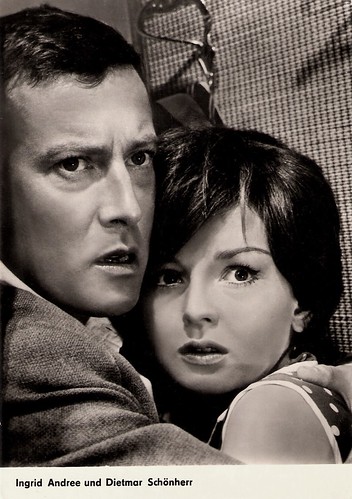
East-German postcard by VEB Progress Film-Vertrieb, Berlin, no. 1847. 1963. Retail price: 0,20 DM. Photo: publicity still for Treibjagd auf ein Leben/Drive on a life (Ralph Lothar, 1961) with Dietmar Schönherr.
Trailer Transfer (Damir Lukacevic, 2010). Source: MovieworldsCOM (YouTube).
Sources: Wikipedia, Stephanie D'Heil (Steffi-line.de - German), and IMDb.

German postcard by WS-Druck, no. F 89. Photo: Klaus Collignon.

German postcard by Ufa, no. CK-77. Photo: Ringpress / Vogelmann.

German postcard by WS-Druck, Wanne-Eickel, no. F 74. Photo: Ringpress.

German postcard by Kolibri-Verlag G.m.b.H, Minden (Westf.), no. F 42. Retail price: 25 Pfg. Photo: Ringpress / Stempka.
Young Girls
Ingrid Andree was born as Ingrid Tilly Unverhau in 1931 in Hamburg, Germany. She was the daughter of a coffee importer, and the niece of actor Joachim Gottschalk.
She followed acting classes from Eduard Marks at the School of Music and Performing Arts in Hamburg. In 1951 she made her stage debut in Ivan Turgenev's One Month in the Country at the Thalia Theater.
She made her film debut in a small supporting role in Professor Nachtfalter/Professor Moth (Rolf Meyer, 1950), starring Johannes Heesters. Her first leading part was in Primanerinnen/Sixth-formers (Rolf Thiele, 1951) with Walter Giller and Erich Ponto.
This film was her breakthrough and the following years she played many young girls in popular German comedies like Liebeserwachen/Love's Awakening (Hans Heinrich, 1953) with Winnie Markus, and Roman einer Siebzehnjährigen/Novel of a Seventeen Year Old (Paul Verhoeven, 1955) with Therese Giehse.
Her most important of the 1950s - and most popular film too - was the Thomas Mann adaptation Bekenntnisse des Hochstaplers Felix Krull/Confessions of Felix Krull (Kurt Hoffmann, 1957). She played Zouzou, Liselotte Pulver played Zaza and Horst Buchholz Felix Krull.
For television John Olden adapted in 1958 the stage play Blick zurück im Zorn/Look Back in Anger by John Osborne. She played the female leading part next to Horst Frank. Her last successes in the cinema were the humorist Krimi Peter Voss, der Millionendieb/Peter Voss, Thief of Millions (Wolfgang Becker, 1958) with O.W. Fischer as Peter Voss, and Der Rest ist Schweigen/The Rest Is Silence (Helmut Käutner, 1959), a Hamlet adaptation situated in the period after WW II, with Hardy Krüger and Peter van Eyck.

West-German postcard by Kolibri-Verlag, Minden/Westf, no. 1694. Photo: Alfred Greven / Schorcht. Publicity still for Du darfst nicht länger schweigen/You Can No Longer Remain Silent (Robert A. Stemmle, 1955).

Dutch postcard by Gebr. Spanjersberg N.V., Rotterdam, no. 1218/459. Photo: Ufa (Universum-Film Aktiengesellschaft, Berlin-Tempelhof). This must be a publicity still for the comedy Schlag auf Schlag/Blow On Blow (Géza von Cziffra, 1959) which starred Peter Alexander, Wolfgang Wahl, Ralf Wolter, and Ingrid Andree.

German postcard by Ufa (Universum-Film Aktiengesellschaft), Berlin-Tempelhof, no. FK 4205. Retail price: 25 Pfg. Photo: Bavaria Film. Publicity still for Und nichts als die Wahrheit.

West-German postcard by Kolibri-Verlag, Minden/Westf, no. 916. Photo: Weidenbaum.
Krimis
From the 1960s on Ingrid Andree focused herself on the theatre. Among her last films were the Krimi Treibjagd auf ein Leben/Hunt for A Life (Ralph Lothar, 1961) with Dietmar Schönherr and Horst Frank, the William Shakespeare adaptation Was Ihr wollt/Twelfth Night (Franz Peter Wirth, 1962), Nachts ging das Telefon/The Phone Rings Every Night (Géza von Cziffra, 1962), and the thriller Polizeirevier Davidswache/Hamburg: City of Vice (Jürgen Roland, 1964).
Her TV performances were mainly theatre adaptations. Since 1969 she was seldom seen anymore on TV. Among her few later TV appearances were guest roles in the Krimi series Der Kommissar (1970) and Derrick (1985).
Andree mainly appeared on stage. From 1967 till 1970 she worked for the Münchner Kammerspielen and from 1971 till 1980 she was a member of the ensemble of the Thalia-Theater in Hamburg under the direction of Boy Gobert. Here she played in 1974 Queen Elisabeth in Maria Stuart under Gobert’s direction. In 1980 she moved on to the Schauspielhaus Köln (Cologne), but in 1985 she returned to the Thalia Theater.
In the early 1990s she switched again to the Schauspielhaus Köln. She also worked as a voice actor for radio and television. She was the German dubbbing voice of a.o. Olivia de Havilland in Die Erbin/The Heiress (William Wyler, 1949), and Ingrid Thulin in Der Ehekäfig/La Cage (Pierre Granier-Deferre, 1975).
She played in Tár úr steini/Tears of Stone (Hilmar Oddsson, 1995), the story of Jon Leifs, Iceland's most celebrated composer, and was filmed in both Iceland and Germany.In 2010, she returned to the screen in Transfer (Damir Lukacevic, 2010). In a futuristic society where the wealthy get to live forever by swapping bodies with refugees, an elderly couple explores this opportunity with harsh consequences.
Ingrid Andree was married from 1959 till 1965 with the actor Hanns Lothar and she is the mother of actress Susanne Lothar. For her work on stage and in the cinema Andree was awarded the Bundesverdienstkreuz.

East-German postcard by Progress Film-Vetrieb, no. 1203. Photo: publicity still for Bekenntnisse des Hochstaplers Felix Krull/Confessions of Felix Krull (Kurt Hoffmann, 1957) with Horst Buchholz.

East-German postcard by VEB Progress Filmvertrieb, Berlin, no. 215/374, 1957. Photo: Standard-Film. Publicity still for Drei vom Varieté/Three from Variety (Kurt Neumann, 1954).

East-German postcard by VEB Progress Film-Vertrieb, Berlin, no. 222, 1957. Photo: Standard-film, Wien. Publicity still for Drei vom Variété/Three from Variety (Kurt Neumann, 1954) with Erich Schellow and Franco Andrei.

East-German postcard by VEB Progress Film-Vertrieb, Berlin, no. 1847. 1963. Retail price: 0,20 DM. Photo: publicity still for Treibjagd auf ein Leben/Drive on a life (Ralph Lothar, 1961) with Dietmar Schönherr.
Trailer Transfer (Damir Lukacevic, 2010). Source: MovieworldsCOM (YouTube).
Sources: Wikipedia, Stephanie D'Heil (Steffi-line.de - German), and IMDb.
No comments:
Post a Comment